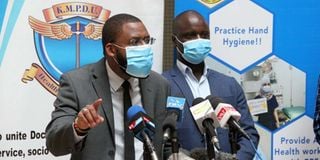Premium
Crisis looms as medical workers announce strike

KMPDU's acting Secretary-General Chibanzi Mwachonda addresses the media in Nairobi on November 24, 2020, flanked by the union's chair Samuel Oroko.
The country is headed for a crisis as healthcare employees begin a boycott to demand safer working conditions and more personal protection equipment (PPE) to help them fight Covid-19.
The crisis comes as infections rise fast, particularly in high risk counties like Nairobi and Mombasa and hospitals and intensive care units are filling up with severely ill coronavirus patients.
The strike also comes just days to the festive season.
With a likelihood of an increase in the number of infections, the strike will present a big challenge to public health.
A health workers’ strike during a global pandemic could devastate the country. There will be no one to attend to severely ill patients.
Patients with special care needs will be left to their own devices while families with financial means will take their sick relatives to private hospitals.
A majority of Kenyan households cannot afford private hospital care.
Growing unrest
The Kenya Medical Research Institute-Kilifi Wellcome Trust says there were six nationwide strikes by health workers and many more in counties between 2010 and 2016.
The workers’ discontent and unrest grew with the devolution of health care in 2013.
Workers and health stakeholders say devolution was rushed, resulting in challenges with human resource management.
The longest work boycott by health workers in the country was by doctors in 2017. It lasted 150 days. A nurses’ strike in the same year took 100 days.
The workers accused devolved governments of failing to implement a salary agreement signed in 2013.
In between, there have been region-specific strikes.
A pattern has developed in which health care employees go on strike but report back to duty before their concerns are unresolved.
During the doctors’ and nurses’ strikes, services in public hospitals were severely disrupted.
Huge strain
Most dispensaries – primarily run by nurses – were closed.
Nurse-led services such as maternity, maternal child health and child welfare clinics were particularly hit hard. Services coordinated by community health workers were also disrupted.
In some hospitals, patients died at the reception, with many being discharged prematurely.
The pandemic has strained the medical fraternity with an increase in the number of infections and deaths among health care workers.
Members of at least 16 unionised health care workplaces across the country have threatened to go on strike from next week.
Numerous meetings between workers’ representatives, including Kenya Medical Practitioners, Pharmacists and Dentists Union (KMPDU), Kenya National Union of Nurses (Knun), Kenya Union of Clinical Officers (Kuco) and government ministries, parliamentary health committees, the National Hospital Insurance Fund (NHIF), the Council of Governors as well as the Salaries and Remunerations Commission have taken place but yielded practically nothing.
No backing down
KMPDU acting Secretary-General Chibanzi Mwachonda on Saturday insisted that until the health workers are provided with enough PPE, comprehensive medical cover and risk and call allowances, the strike is on.
Substandard and erratic supply of the PPE, the unions say, have led to doctors and health workers contracting coronavirus and dying from the disease.
Among those who have died are reconstructive and plastic surgeon Emarah Ahraf, periodontal surgeon Hudson Alumera, Thika level Five deputy medical superintendent Jackline Njoroge, bariatric, general and laparoscopy surgeon Vladmir Schukuin and pulmonologist Robert Ayisi.
“Our members have worked in extremely difficult, draining, hazardous and injurious environments,” Dr Mwachonda said.
“We will not call off the strike until our demands are met. That includes hiring more doctors. We gave the relevant government and county government authorities three weeks for engagement but they did not honour the plea. The strike begins at midnight.”
He said health workers hired to offer services at isolation centres during the pandemic have not been paid and are not insured.
NHIF issue
Health Chief Administrative Secretary Rashid Aman recently said the NHIF matter would be addressed.
NHIF chief executive Peter Kamunyo said these doctors would have medical cover from December 1.
Though the government provided covid-19 allowances to health care workers, the agreement only lasted three months.
The unions want the allowance reinstated as the country is still battling the virus.
KMPDU also wants the government to hire more than 2,000 doctors, saying the current workforce is stretched.
Labour and Social Protection Cabinet Secretary Simon Chelugui and Health Principal Secretary Susan Mochache recently said the government has set aside more than Sh6.3 billion to provide comprehensive medical cover to health care workers.
NHIF, however, says it cannot offer the services for it has not received the amount.
No help
A member of Kuco died from the virus on Saturday but NHIF said it cannot foot the medical bill until it is directed by the government.
“We appreciate that the announcement was made to the media. However, there is no directive to the effect that our members should be covered,” Kuco Secretary-General George Gibore said.
“Our strike begins on Tuesday. Why would we have to raise Sh2 million for medical and funeral expenses yet our colleague was a government employee?”
He told the Nation that 37 of their members are admitted to hospital yet the national insurer has declined to settle their bills.
The National Assembly on Tuesday adopted a report by its Health Committee.
The report is expected to address most grievances raised by health workers if adopted.






